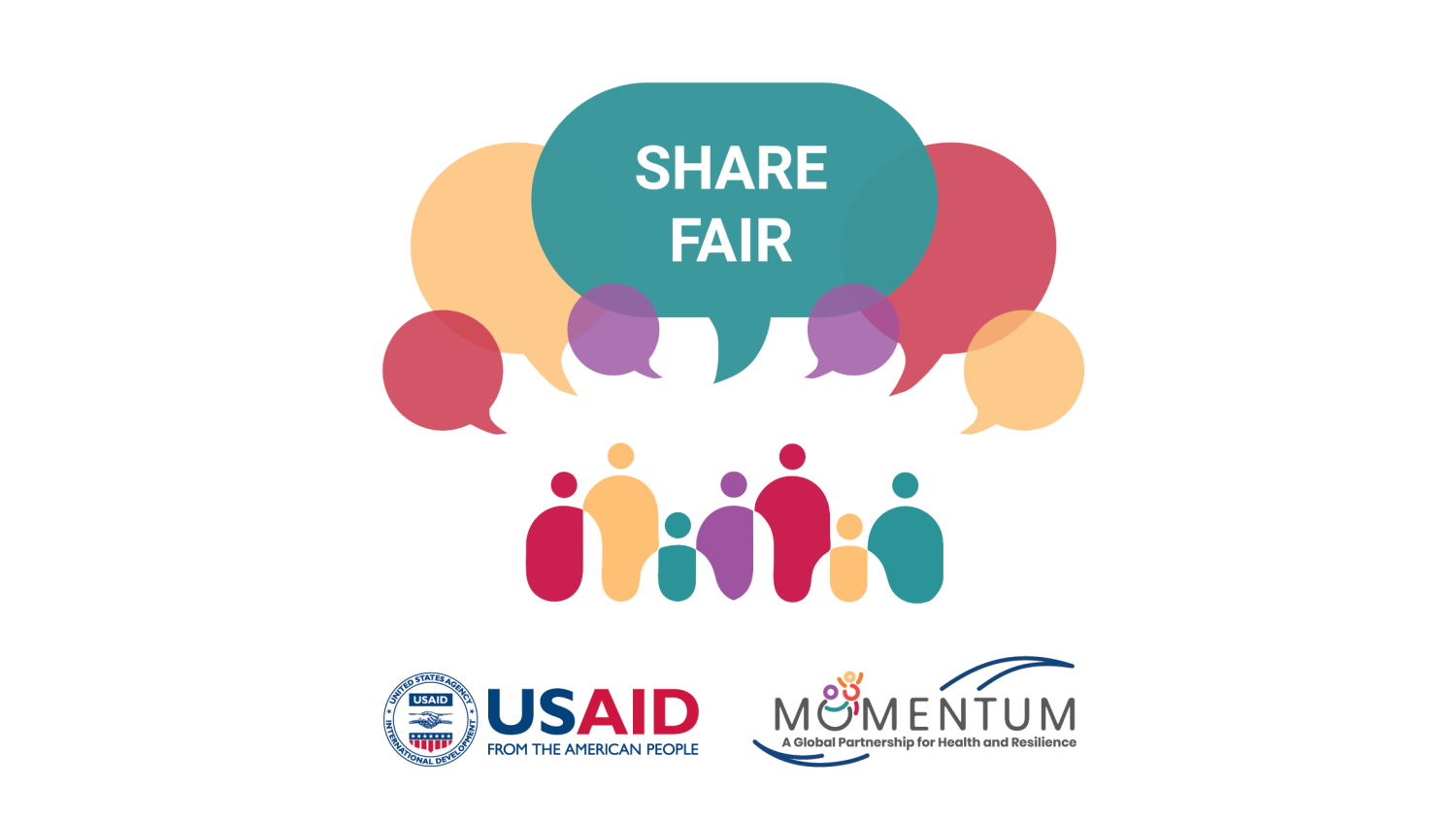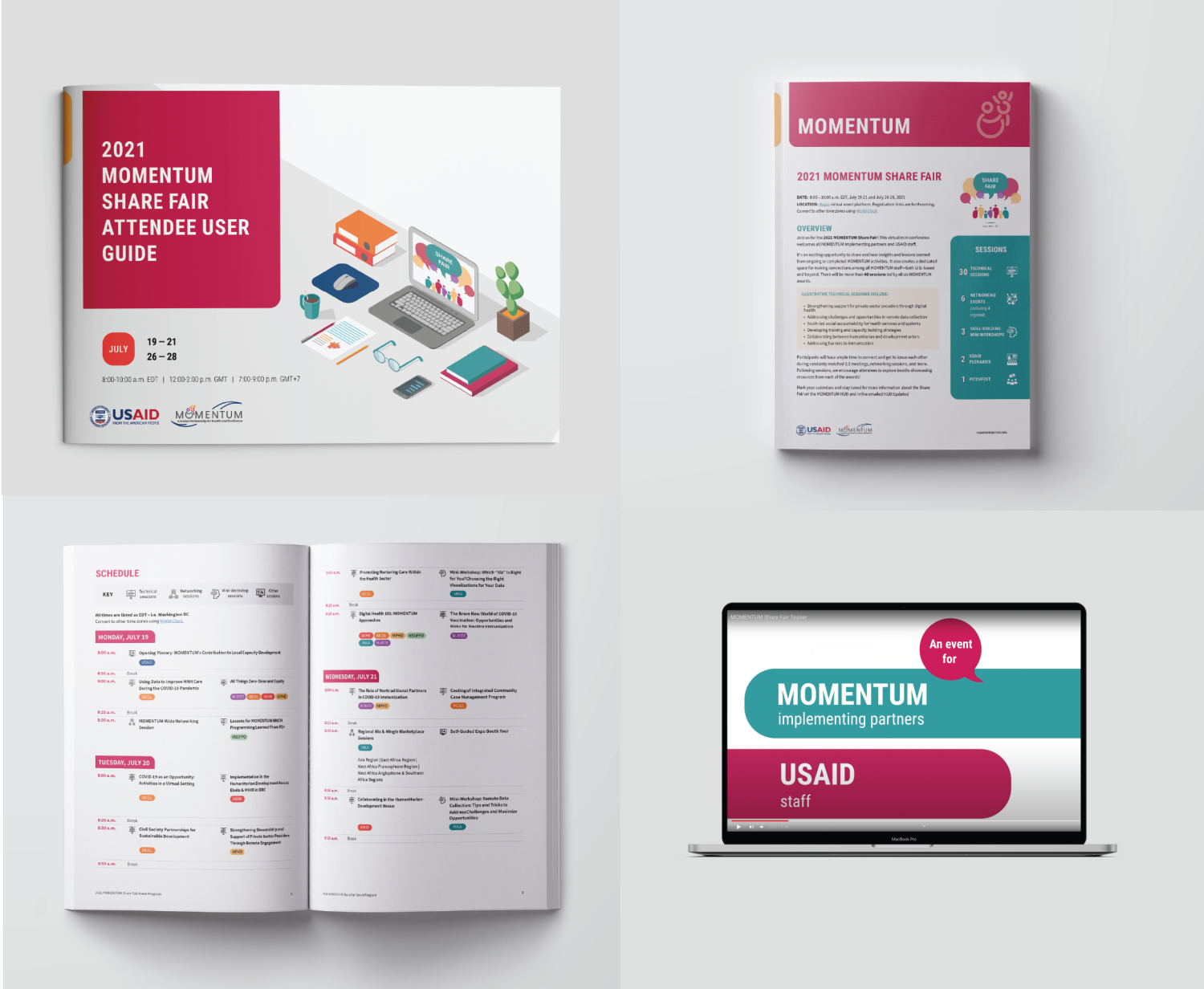What We Learned From Hosting an Inaugural Event During COVID-19: Lessons From MOMENTUM's Virtual Share Fair
Looking to promote meaningful knowledge exchange and collaboration among a diverse set of participants in a virtual environment? Read our reflections from MOMENTUM's first-ever Share Fair during COVID-19.

The COVID-19 pandemic has fundamentally changed the way we work. Project staff and stakeholders from across the globe can now convene virtually “in the same room”. But this new reality requires a unique way of planning and implementing to ensure gatherings remain valuable and achieve their goals.
In July 2021, the USAID-funded MOMENTUM project—a suite of six awards designed to improve maternal, newborn, and child health, voluntary family planning, and reproductive health (MNCH/FP/RH) services globally—held its first-ever virtual Share Fair.
The mini-conference, hosted via the Hopin platform, ran for two hours each morning from Monday to Wednesday over two weeks. The event featured 44, 25-minute sessions, where more than 300 participants from 36 countries and nearly 30 organizations shared data, insights, tools, and resources. The Share Fair also helped identify opportunities for coordination and collaboration and fostered a sense of connectedness among colleagues.
The following lessons learned from the event may be useful to other networks, projects, or groups aiming to promote meaningful knowledge exchange and collaboration among a diverse set of participants in a virtual environment:
1. Identify your most important criteria for choosing a platform: We chose Hopin for its exceptionally low cost, conference-like interface, and features like one-on-one networking and virtual expo booths for showcasing resources. Based on our experience, when planning our next Share Fair, we will consider options that address other emergent priorities, such as enabling content translation, live interpretation, pre-session setup, and dynamic, verbal discussion among participants.
2. Be realistic about how much time people can commit: While we selected an event format intended to limit interference with workday commitments, we found that the structure was still too time intensive for our audience, and attendance notable waned over time. Next time, we might consider holding more but shorter events throughout the year or condensing the content to fit into one week. For the sessions, some liked that the concise 25-minute length felt light and allowed them to learn about multiple topics in a short time. The downside is it didn't allow much time for substantive discussion or Q&A.
3. Find creative ways to signify the event’s importance: We created visually compelling event branding for a range of promotional and resource materials, including our event flyer, agenda, and teaser video. The branding gave the event an exciting, polished feel and distinguished it from a generic meeting. We also recruited colleagues across the MOMENTUM awards and USAID, including senior leadership, to promote the event via email and other channels using pre-drafted messaging. Together, these approaches helped raise the event’s profile and signaled to staff: “This is important, you should attend.” That said, to optimize attendance at our next Share Fair, we will enhance promotion through early and more direct engagement, especially with country-based staff.

4. Use interactive tools to make sessions engaging: Encourage presenters to use tools like Kahoot!, Mentimeter, and Poll Everwhere that engage audiences through real-time quizzes, word clouds, and polling. Even asking participants to answer questions or share comments in the chat (and pausing until they do) works well! Use these strategies within the first few minutes of a session to encourage participation, rather than presenting first and saving engagement for later. During the event, we also found that collaboratively led sessions that brought together presenters with diverse perspectives on a particular topic were well-liked and highly attended.
5. Explore out-of-the-box session types: We offered unique opportunities for learning and sharing, such as regionally focused "miz and mingle" session using prompts from Miro that allowed participants to share what they were working on and what they hoped to learn in the upcoming year. During our “pitchfest,” audience members voted on six, two-minute light-lift proposals for improving learning and collaboration. Mini-workshops also provided attendees the chance to hone skills in areas like data visualization, remote data collection, and coaching.
6. Invest in translation services: As was the case with the Share Fair, global health events are often English-centric, making it difficult for presenters and participants who are not fluent in English to engage fully. To reach a broader audience, consider investing time and resources in translating key promotional and technical materials, advertising the event’s language options to motivate attendance, and offering live sessions in multiple languages. In our case, we learned that more Share Fair resources and sessions should have been available in French. While the quality varies, note that some meeting platforms offer translation options, ranging from no-cost, caption translation (such as Google Meets) to integrated interpretation at a cost (such as GoToMeeting and Zoom).
7. Be open to adapting in real time: No matter how well you plan your event, some things won’t work as intended. To ensure success, be flexible and don’t be afraid to make changes in real time or mid-event. We revised our staffing plan to reflect realistic support needs, shifted how we shared messages via the event chat to increase visibility and engagement, and started using PowerPoint's translation function mid-event to enable better participation by Francophone staff. To help identify needed pivots, you can set up short daily debrief meetings or an online chat where event organizers can easily share ongoing challenges and insights.
8. Make it easy for people to follow up on connections: When your event ends, it’s crucial to help sustain participants’ interest in the information shared and connections made. After the Share Fair, we created a searchable, dedicated page on MOMENTUM’s intranet for presentations, recordings, and points of contact for each session to ensure people could access information, see what they missed, and get in touch with the right people to learn more. Next time, we plan to proactively highlight connections made during the event and follow up to facilitate further action or document outcomes. To reinforce informal connections made between attendees, we also plan to offer options or reminders for easily sharing contact information in real time.
9. Take time to reflect and assess what did and didn’t work: After concluding an event, it’s tempting to check the box and move on to the next activity. But it’s important to take the time to assess what worked and what didn’t so that lessons can be applied in the future. Remember to get feedback from participants, presenters, and organizers. You can use short, in-session surveys, post-event surveys, and after-action reviews like we did to gather quantitative and qualitative information on whether key objectives were met and suggestions for improving content and processes in the future. Remember to share key lessons with others, for example, through a blog like this one, so they can learn and adapt their own initiatives.
Overall, the 2021 Share Fair was successful in providing a way for participants to showcase their work, learn from each other, identify useful resources and opportunities for collaboration, and feel connected to others across the suite of MOMENTUM awards. We plan to apply the lessons learned to improve our future knowledge-exchange events.
Like these tips or have others to share? Let us know in the comments and share this blog with your colleagues to spread the word about these insights!
To learn more about MOMENTUM, check out our progress report and other resources on MOMENTUM’s website.



